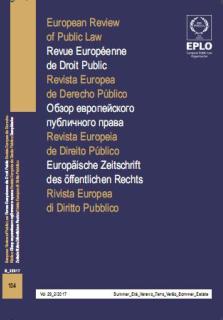
Constitutional Law / Droit constitutionnel
2016
The Netherlands / Pays-Bas
Professor of Public Institutional Law at Utrecht University
Legal Research Master Student at Utrecht University
In response to the outcome of the advisory referendum on the EU-Ukraine Association Agreement, the Dutch government - after having secured a legally binding declaration of the European Council addressing the concerns of the Dutch electorate (62% of the voters voted against ratification) - proposed to Parliament to ratify the Agreement. Two significant events relating to the Intelligence and Security Services occurred: the Ministerial Responsibility Act will be modernised in order to secure adequate prosecution in cases of leaks from the Parliamentary Committee on the Intelligence and Security Services and a new Intelligence and Security Services Act was presented by government. Several constitutional amendments are under consideration by Parliament. The very same Parliament will most likely become the subject of a broad reflection by a State Committee on the Parliamentary System. Geert Wilders, the leader of the far-right Party for Freedom (PVV), was convicted on counts of insulting a group and incitement to discrimination. The judicial dialogue between the European Court of Human Rights and the Dutch Supreme Court on the Dutch statutory framework on the life sentence resulted in a constitutional novelty: the Supreme Court postponed its final judgment in a case on the implementation of the life sentence and set a deadline to government to give it ample opportunity to adjust the statutory framework to the requirements set out by the ECtHR.
En réponse au résultat du référendum consultatif sur l’accord d’association UE-Ukraine, le gouvernement néerlandais - après avoir obtenu une déclaration juridiquement contraignante du Conseil européen prenant en compte les préoccupations de l’électorat néerlandais (62% des électeurs ont voté contre la ratification) - a proposé au Parlement de ratifier l’accord. Deux événements importants liés aux services de renseignement et de sécurité se sont produits: la loi sur la responsabilité ministérielle va être modernisée afin de garantir une poursuite adéquate en cas de fuites provenant de la commission parlementaire sur les services de renseignement et de sécurité, et une nouvelle loi sur les services de renseignement et de sécurité a été présentée par le gouvernement. Quelques amendements constitutionnels sont en cours d’examen par le Parlement. Ce même Parlement va probablement faire l’objet d’une vaste réflexion au sein d’un comité d’Etat sur le système parlementaire. Geert Wilders, le leader du Parti pour la liberté (extrême droite), a été déclaré coupable du chef d’accusation d’insultes à un groupe et d’incitation à la discrimination. Le dialogue juridictionnel entre la Cour européenne des droits de l’homme et la Cour suprême néerlandaise sur le cadre statutaire néerlandais de la prison à vie a débouché sur une nouveauté constitutionnelle: la Cour suprême a reporté son jugement final dans une affaire où la prison à vie était demandée et a posé un délai au gouvernement pour lui donner la possibilité d’adapter le cadre statutaire aux exigences posées par la Cour européenne des droits de l’homme.





















